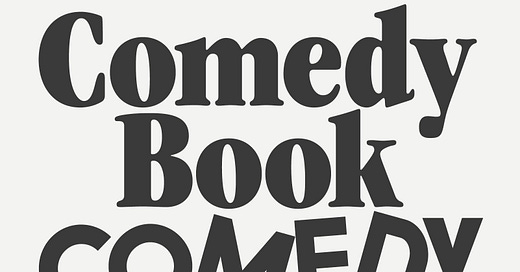On shock therapy, righteous indignation, and why comedy's so lonely
Highlights from "Comedy Book: How Comedy Conquered Culture—and the Magic That Makes It Work" by Jesse David Fox.
Comedy Book: How Comedy Conquered Culture—and the Magic That Makes It Work by Jesse David Fox is filled with great quotes and standup comedy insights. I enjoyed it a lot!
Weaving together history and analysis, Fox unravels the genre’s political legacy through an ode to Jon Stewart, interrogates the divide between highbrow and lowbrow via Adam Sandler, and unpacks how marginalized comics create spaces for their communities. Along the way, Fox covers topics ranging from comedy in the age of political correctness and Will Smith’s slap, to the right wing’s relationship with comedy, to comedy’s ability to heal in the wake of tragedy.
Some highlights below…
Standup is not a mirror to society:
They are the spokespeople for the unspoken perspective of their fan base. Stand-ups do not hold up a mirror to society, as is commonly said. No, at their best, they create a picture of a society that is rendered more and more accurate with each performance, so when they film the special it looks like a perfect reflection. The comedian is trying to bring aspects of the collective unconscious into the collective consciousness.
On righteous indignation:
Marc Maron: “For me, comedy was a way of processing whatever my sense of truth was and my sense of righteous indignation. I saw comedy as a platform that you worked through things on. For me, the challenge was: How do we make this funny? How do we make this relevant through comedy? It’s sort of our duty to try to disarm this a bit and process it so people can move through their fear and anger to a degree. I didn’t feel like I was entertaining the troops; I felt like, We’ve got to process this collectively and it’s going to go through me, the way I do it.”
Comedy as shock therapy:
We knew we had seen something remarkable, not because the joke was so funny but because it had served as shock therapy, harmless shock therapy for an adult audience, that at least temporarily relieved us of our burdens and jolted us back into the land of the living again … At a terrible time, it was an incongruous but welcome gift. He was inviting us to once again let loose.”
“Tragedy and comedy are roommates,” [Gilbert] Gottfried would tell me. “Wherever tragedy’s around, comedy’s a few feet behind them sticking his tongue out and making obscene gestures.”
Being genuine:
Start with exactly what happened and then alter it more and more with each draft until they get to what feels most genuine as a story, even if it is less autobiographical…
[John Early] says, “To fail to be honest is honest, much more than ‘my father did this’ and ‘my mother did this.’” If the situation is inherently fake, the only way to tell the truth is by acknowledging its falseness.
Killing is overrated:
Countless comedians throughout history have pushed the boundaries of what is acceptable to say. It’s why the comedian who Nanette-era Gadsby most reminds me of onstage is Patrice O’Neal—the equal parts feared and revered comic’s comic who was known for pushing the audience’s limits on topics like race and gender—because both found killing overrated and wouldn’t let the audience’s desire to have a nice night out deter them from sharing the parts of themselves that others might be uncomfortable with.
On being edgy:
If you are saying supposedly offensive things and the audience is instantly all on board, it is not a comedy show, it’s a rally.
On comedy, art, and loneliness:
Laughter is social. People are thirty times more likely to laugh with other people than alone…
Critic Jennifer Wilson: “[Art] can establish a connective thread between yourself and millions of strangers across space and time, yet the process of making it requires extensive time alone and disconnection from the three or four people in your life you care about the most.”
…
Being a comic is a perversion of the artist’s existence—they cannot be alone to create, but they are charged with carrying their disconnection along with them through life.





I did stand up for about eight years and did well but had to stop because everywhere a comic goes there are fifty other comics getting all up in his face.I am just not friendly enough to deal with that.
Dear Matt,
Thanks for sharing!
"Comedy Book" is great!
Love
Myq